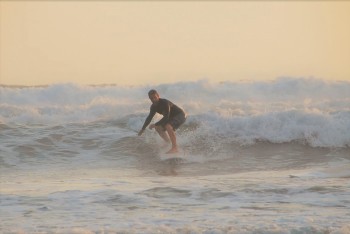Winter In The Sun
  

This winter was our third time in the last 2 years visiting Costa Rica. This time we left in early February and stayed for 5 weeks. Being only 5-10 min from great surf breaks meant that any day that we weren't riding horses or ATV's, we were working on our surfing skills ! Thankful for my new assistant who held down the fort back home and made my working remotely even better and easier!
Take a few minutes and watch the largest waves in the world found in Portugal.
BIG WAVES
MORE BIG WAVES
Time To Renew?
  

Around 47 per cent of all existing mortgages will need to be refinanced this year, according to CIBC estimates, up from the 25 to 35 per cent range in what the bank says is a typical year. It attributes the increase to the unintended consequence of regulatory changes in recent years.
Finish reading the article here
Three Calculations Every Real Estate Investor Should Know
  

Don't let your fear of math prevent you from making smart decisions on your real estate investments. These five calculations are easy to do. Even a mortgage broker could do them!
1. CAP RATE
Net Operating Income / Total Price of Property
How to Calculate Cap Rate (with pictures)
This calculation is mostly used for valuing apartment complexes and commercial buildings. It can be used for houses and small multifamily too, but operating expenses are erratic with houses.
Aim for a cap rate that is at least as good as comparable buildings in the area. Ideally, strive for an 8.00% cap rate or better, although in some areas like Vancouver or Toronto, that’s not really possible. And always be sure to use real numbers or your own estimates when calculating this.
2. GROSS YIELD
Annual Rental Income / Property Value
This is the income return on your investment before any expenses, outgoings or possible rental vacancies are taken into account. Gross yield also does not take interest rates into account.
Gross rental yield is commonly used when looking at returns, as it is simple to calculate and lets you easily compare properties with different values and rental returns.
To calculate, take the 'Annual rental income (Weekly rent x 52 weeks)' and divide by the 'Property value'. Then multiply this number by 100.
Example: Property value $600,000 and expected rent $500 a week.
$26,000 ($500 x 52 weeks) (annual rental income)
÷ $600,000 (property value)
x 100
Yield = 4.33% ROI (Return On Investment)
3. CASH FLOW
Cash flow is important if you are hoping to make money month to month on your real estate investment. It is important to consider the monthly cost of borrowing your money, maintenance fees, heating, insurance and taxes. It is also important to estimate the cost of having a vacant unit for a month or two. Giving yourself this buffer, will insure that you will need a 100% tenanted property to be profitable or cash flow positive. If you are investing in the city, rents have steadily increased. Vacancy rate is under 1% which puts upward pressure on the monthly rental prices.
Those are the basic operational items that go into our cash flow calculation. Let's take our calculation to the profits:
Rent income - Vacancy Loss - Payments - Expenses = Cash Flow
Analyzing your return as "cash on cash invested", you would divide your actual cash investment (down payment) into the annual return of cash.
|